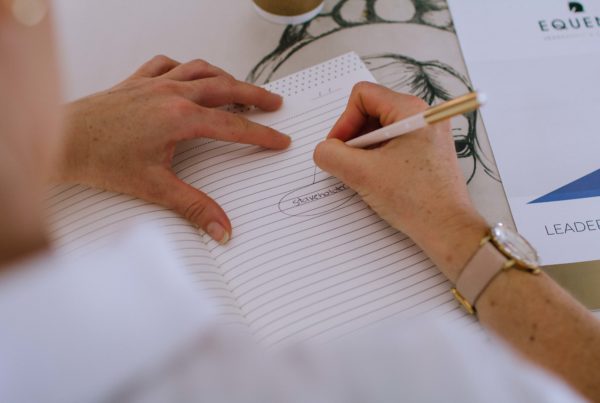It happens to the best of us – and as it turns out, it happens to the best of horses, too. I’m talking about a “career change”. That moment, expected or unexpected, that redefines our working identity; the sense of who we are as professionals and how we contribute.
To set the context… after extensive tests, months of ongoing treatment and consultations with our vet, this week I need to have a tough conversation with my beautiful 14-year-old Standardbred, Fez, that it’s time for a career change. Fezzy has already proven himself to be an extremely versatile contributor, having been an elite athlete and then my trusted trail horse for the past five years. Now, due to a lurking degenerative injury he’s about to “retire” from being a ridden horse, and shall be galloping towards a career in Equine Assisted Learning (EAL). This means that he’ll be working exclusively with leaders and kids, helping to develop the self-awareness they require to become outstanding leaders and contributors.
So, how shall I lead and guide my trusted partner through this challenging and defining moment?
First, as with most career changes, we must recognise that it’s not necessarily what’s on Fez’s resume (his tangible skills) that will support him through this career change – for example, no amount of harness-racing or trail-riding experience is going to directly help him to become a better EAL partner. What does count though, is his absolute willingness to learn – and like people in the workplace, this quality is pure gold and must not be traded for anything! This means I’ve got good material to work with…
Next, my ultimate responsibility to Fez as his leader is to guide him through this career change in a way that actually builds and strengthens his spirit – to maximise his strengths, make his injury and vulnerabilities irrelevant, and allow him to be 100% certain that his next job is critically important and meaningful.
Translating all this back to the workplace, all too often we see leaders forgetting that one of their most critical roles is keeping the capabilities of their team contemporary and relevant, developing and leveraging their various strengths to allow them to contribute in strategically aligned ways. Instead, we see leaders making the mistake of expecting their team to “just know” how to stay current and on track in the business. In fact, this is the worst and quickest way to set your team up for redundant capability. Sadly, leaders can prematurely (and often subconsciously) retire to “pasture” those who have not kept pace with the business, wasting their talents and desire to contribute – so what follows is disengagement, waning confidence and low expectations for contribution.
As leaders, we must always be alert to opportunities to leverage the strengths of our team to keep them engaged and contributing, and to do so in ways which are contemporary, aligned to business requirements and versatile to changing market conditions. And yep, sometimes this will involve tough conversations.
So it’s worth asking yourself: “Am I honouring my team by supporting them to stay up-to-date, contemporary and relevant in our business?”
Finally, back to Fezzy…. he has so many beautiful strengths to work with, including a stable (pardon the horse pun) and forgiving disposition, earnestness, excellent manners, a strong desire to please, always giving his best “try” and an overriding sense of respect and gentleness towards his handlers. My commitment is to develop all of his best qualities as an EAL partner, so that he can become my main man for working with leaders and kids – keeping him contributing meaningfully and building his spirit in the process.
If you’d like more information about how horses can teach us about ourselves, and what great leadership looks like, drop me a line at angela@equenti.com or check out our Hooked on Leadership program at www.hookedonleadership.com.au
www.equenti.com




